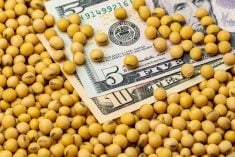Chicago | Reuters — U.S. grain and soybean futures slumped on Tuesday with strong crop ratings and increased forecasts for global harvests pushing Chicago Board of Trade wheat to a one-month low.
Wheat prices came under pressure after the U.S. Department of Agriculture, in a weekly report issued late on Monday, rated 60 per cent of the U.S. winter wheat crop in good to excellent condition. That was unchanged from the previous week and in line with trade expectations, but up from 31 per cent a year ago.
Read Also

U.S. grains: Soy futures post biggest monthly gain in nearly five years on China trade optimism
U.S. soybean futures climbed to a 15-month high and posted their biggest monthly gain in nearly five years on Friday following a rally fueled by the prospect of revived exports to China.
The ratings helped fuel projections for plentiful global inventories among traders after Germany’s association of farm co-operatives on Tuesday said the country’s wheat harvest will jump 20.6 per cent in 2019.
Agriculture consultancy SovEcon a day earlier raised its forecast for Russia’s 2019 wheat crop to 83.4 million tonnes from 80 million tonnes, signaling bigger supplies in the world’s top exporter.
“Wheat is the loss-leader today,” said Karl Setzer, operations manager for Citizens LLC, a U.S. grain elevator company.
The most active wheat contract on the CBOT lost 14-1/2 cents at $4.45 a bushel (all figures US$). K.C. hard red winter wheat and MGEX spring wheat set contract lows.
CBOT corn sagged 3-3/4 cents to $3.59 a bushel. Soybeans sank 10-3/4 cents to $8.88 a bushel.
USDA, in its Monday report, said three per cent of the corn crop was planted, behind the five-year average of five per cent. Wet weather has slowed planting in parts of the Delta region and Midwest, and more rain is expected later this week, according to forecasters.
However, traders said they were not overly worried about planting delays yet because there is still time to put the crop in the ground without reducing yields. Also, farmers can use large planting machines to plant crops quickly.
“Planting delays don’t mean anything right now,” said Jim Gerlach, president of U.S. broker A/C Trading.
In the soybean market, heavily reliant on Chinese imports, hopes for a positive outcome from U.S.-China trade talks have underpinned prices. But massive disruptions to China’s pig sector due to the African swine fever hog disease could cut demand for soymeal feed even in the event of a trade agreement with Washington.
Also, the details and timing of a trade agreement remain uncertain, Gerlach said.
“If you’re a bull in the market, everything you can hang your hat on right now is an ‘if’ or a ‘maybe,'” he said. “The bears are trading the here and now.”
— Reporting for Reuters by Tom Polansek in Chicago; additional reporting by Gus Trompiz in Paris and Naveen Thukral in Singapore.











